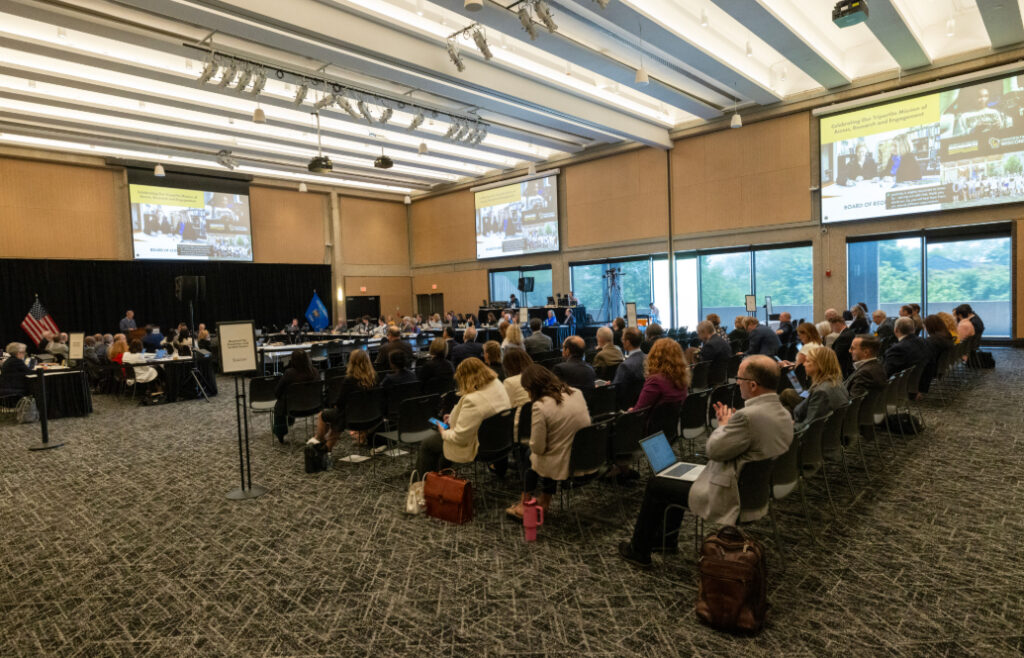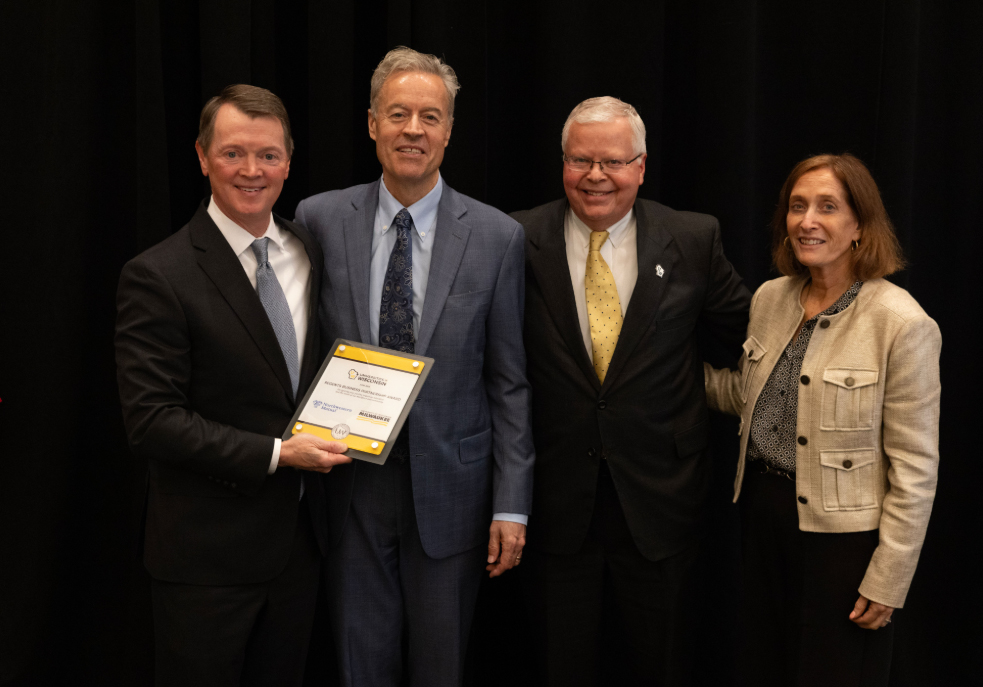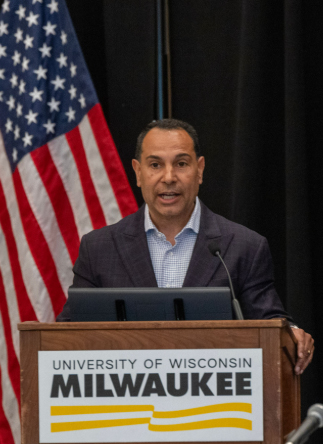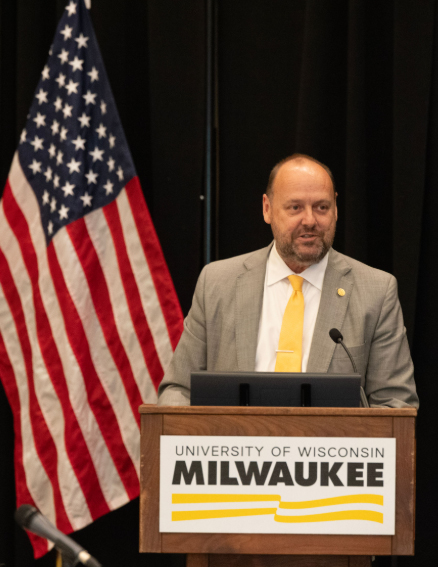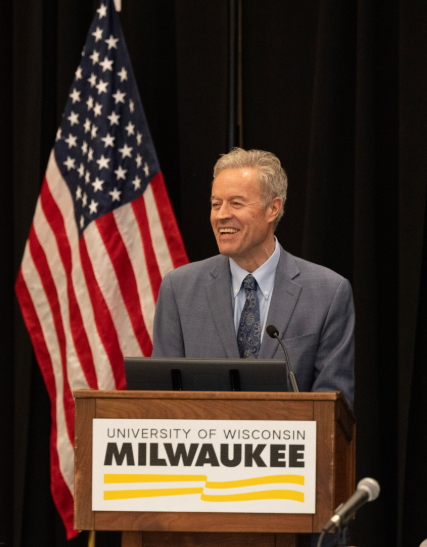MILWAUKEE – Universities of Wisconsin President Jay Rothman reiterated to the Board of Regents today profound concern over the implications of cuts to federal financial aid for students as well as federal funding for university research.
“For generations – from the time of the GI Bill to today – the federal government has been a foundation for ensuring students and families from all socioeconomic backgrounds are offered lifechanging experiences that higher education can provide,” Rothman said. “Unfortunately, under the reconciliation bill before Congress, those opportunities are now in jeopardy – and we cannot afford to just stand by and watch.”
To highlight the impact of federal financial aid, Rothman told Regents the UWs have created a web page – wisconsin.edu/fuelfutures – for UW students and graduates to share their stories about how Pell Grants and other aid creates educational opportunities.
- See the UWs news release, “New Universities of Wisconsin web page Fuel Futures highlights impact of federal financial aid”
Two UW-Milwaukee students, both Milwaukee natives, shared with Regents how they personally have benefited from receiving Pell Grant funding.
“As a first-generation college student, I cannot stress how critical this has been to the success I have found both professionally and personally as it has allowed me to focus on my education and build the confidence to pursue my goals wholeheartedly,” said Amber Moreno-Padilla, a junior majoring in Journalism, Advertising, and Media Studies.
Diante Johnson Jr., a senior biological science major, said the Pell Grants help cover essentials such as educational materials and summer courses. “I want to see students who come after me be able to focus on their goals and aspirations, not on how to pay for them,” he said. “I want to see change, so I am here today to be a part of it.”
Turning to cuts in federal funding for university research, Rothman said a key ingredient in America’s competitive advantage in the world is its research infrastructure, built and designed in no small part by the federal government to leverage the expertise and innovative minds found at the nation’s universities.
“For decades, every American has benefited in ways large and small from the results of that partnership – from technologies that secure our national defense and energy abundance, enhance our quality of life, improve our natural resources, bring new and life-saving therapies to patients, and create the jobs, companies, and economic prosperity that sustain our country,” Rothman said.
“Our world continues to face great challenges being met by the world’s best minds,” he continued. “But should tomorrow’s technological advancements take place in America’s universities or elsewhere? I think the answer to that is pretty clear.”
UW-Milwaukee celebrates its unique mission
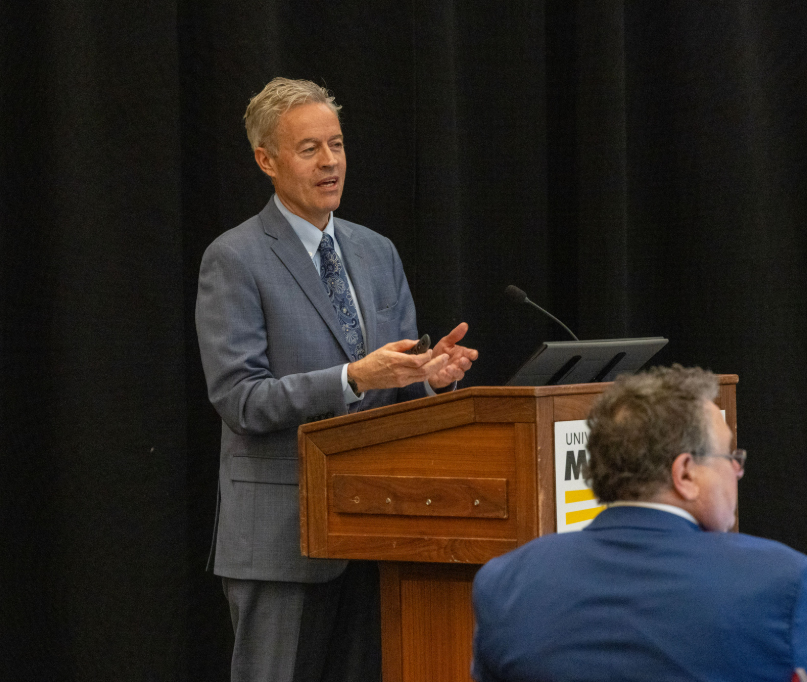
Chancellor Mark Mone welcomes the Board of Regents to its annual meeting hosted by UW-Milwaukee. (Troye Fox/UWM)
Chancellor Mark Mone highlighted the impact of UWM’s unique three-part mission in the host-campus presentation, “Celebrating Our Tripartite Mission of Access, Research and Engagement.”
Mone noted that UWM is one of only 32 universities in the nation to be recognized by the Carnegie Classification of Institutions of Higher Education for providing high access to education and conducting top-tier research, as well as promoting community engagement.
He said there is no better change agent than a university that provides talent, solves problems and applies know-how to real-world problems. Stressing the importance of change, Mone explained, “It’s a little-known fact that learning is generally defined as relatively permanent change in behavior, skills, knowledge or attitudes resulting from psychological or social experiences.”
To illustrate the impact of UWM’s three-part mission and the changes the university has brought about, Mone told several stories about students, alumni, faculty and community partners.
He mentioned partnerships that provide more people with access to education, including M-Cubed, which encourages Milwaukee Public School students to pursue higher education opportunities at Milwaukee Area Technical College and UWM, as well as agreements UWM has made with area technical colleges to ensure transfer students will have at least 60 credits accepted in the process.
Noting that UWM has earned the Carnegie Research 1 designation four times in a row, Mone said the university’s commitment to research was one of the reasons Microsoft chose UWM to host its AI Co-Innovation Lab, the first in the nation to focus on manufacturing. Research projects are already underway at the lab, which will officially open on UWM’s campus on June 25. Mone credited the UWM Research Foundation with helping faculty and students obtain 215 patents and 47 active license and option agreements.
Focusing on UWM’s community engagement mission, Mone emphasized how experiential learning – in the form of co-ops, internships, clinical work placements and student teaching experiences – helps prepare more than 4,500 students per year for the job market. Students are also engaged in more than 50,000 community service hours per year.
Wisconsin has a growing shortage of health care workers, and Mone encouraged the Board of Regents’ support for UWM’s Health Sciences Renovation project, asking “How often do you hear a chancellor say, ‘We are turning students away.’” The proposed renovation would allow UWM to enroll 300 more health care majors per year. These additional health care workers would help reduce patient wait times, decrease costs and increase access to care.
Mone concluded by calling for support for the university.
“Through our unique tripartite mission, UWM changes lives and strengthens families because education is the great equalizer,” Mone said. “These qualities help us attract and retain key talent in Wisconsin. After all, what is a successful economic region in the world that doesn’t have an access, research and engaged university at the heart of it? We need talent, research and engagement, and I implore you to keep that going.”
Board President’s Report
In her regular report to the Board, Regent President Amy B. Bogost told Regents that with the departure of several current chancellors, new chancellor search processes are expected, though no timelines have been determined to date.
In an update on recent presentations of Regent Business Partnership Awards, Bogost recognized the awards presented in mid-April to UW-Stevens Point and Skyward, an educational software developer based in Stevens Point.
“The company has long supported UW-Stevens Point through hundreds of student internships and employment opportunities as well as scholarships and student support programs,” said Bogost. She noted that UWSP alumni make up more than 40% of Skyward’s workforce.
Awards presented later in the June board meeting recognized UW-Milwaukee and Northwestern Mutual.
UWs President’s Report
In addition to addressing federal funding cuts, in his report to the Board Rothman recapped some recent outreach initiatives undertaken to encourage support for increased state funding for the UWs in the coming biennial budget.
An advocacy event hosted last month at Green Bay’s TitletownTech in collaboration with UW-Green Bay, UW-Oshkosh, TitletownTech and New North attracted more than 100 leaders from across Green Bay, Oshkosh, and the Fox Valley. The event featured a dynamic panel discussion about the role the UWs play in the economic vibrancy of northeast Wisconsin as well as the entire state, Rothman said.
Rothman also noted the latest round of Mascots on Main videos, where chancellors along with their university mascot visit local businesses to highlight community partnerships. Following up on previous videos from UW-Platteville, UW-Stevens Point, and UW-Whitewater, today’s videos montage featured UW-Eau Claire, UW-Milwaukee, UW-Oshkosh, and UW-Parkside.
In other outreach, Rothman said the UWs are reprising the well-received “Faculty Shout-Out” initiative from last year, which includes students speaking on video about a faculty or staff member who made a significant difference in their lives. The videos from all 13 universities should start appearing on social media channels in early summer.
Turning to state updates, Rothman said the UWs are continuing conversations with the Governor’s office, legislative leaders, and Joint Finance Committee members as part of the ongoing 2025-27 biennial budget process.
On the federal front, Rothman told Regents that leaders from all three of the state’s higher education systems (Universities of Wisconsin, Wisconsin Technical College System, and Wisconsin Association of Independent Colleges and Universities) recently came together for a news conference to send a unified message communicating concerns about the federal government’s reconciliation package and its impact on education.
“I do believe our congressional representatives understand the value of the Universities of Wisconsin – and higher education more broadly – and our advocacy will continue as the bill is considered in the Senate,” Rothman said.
Regents re-elect Board leadership
The Regents re-elected Regent Amy B. Bogost to a one-year term as Board President. Bogost, a graduate of UW-Madison and previously Regent Vice-President, will begin her second year as president effective immediately. Regents also re-elected Regent Kyle Weatherly as Vice President for a second year.
- See UWs news release, “UW Board of Regents re-elects Regent Amy B. Bogost as President and Regent Kyle Weatherly as Vice President”
“Over the past year we’ve navigated significant challenges together and we have seen some victories. Now as we stand at a very critical juncture,” Bogost said. “The challenges facing higher education today are so complex and too significant for any single individual to address this alone. They require the collective wisdom, experience, and commitment of all 18 members of this board as well as our President, Jay Rothman, and all of us working in concert.”
She said Rothman’s five-year strategic plan has set the UWs on the right trajectory. “The decisions we make in the coming year will reverberate for decades to come. We have the opportunity to emerge from recent challenges stronger, more focused, and better positioned to serve Wisconsin students and communities than ever before.”
Weatherly thanked his Regent colleagues. “I’ve learned a ton from you, and I’m really excited about the upcoming year,” he said, adding that they should know he’s always available “if there’s anything you think I can do better, or anything we should be focusing on.”
Both Bogost and Weatherly joined the board in May 2020.
UW-Madison undergraduate application fee to increase
UW-Madison’s request for a $10 increase in its undergraduate application fee from its current level of $70 was approved by the Business & Finance Committee and subsequently by the full board. This new rate will be effective for the 2025-26 application cycle and remains in range of UW-Madison’s peer institutions. The increase is expected to generate an additional $600,000 in support of the admissions operation as it manages and reviews record numbers of first-year and transfer applications.
Regents Business Partnership Award presented
Regent President Amy Bogost presented UW-Milwaukee and Northwestern Mutual with the latest Regents Business Partnership Awards. The awards were created several years ago to highlight the mutually beneficial relationships between the Universities of Wisconsin and Wisconsin’s business community.
Bogost noted that UWM’s partnership with Northwestern Mutual dates back almost 50 years and has included very generous sponsorship and support for UWM’s research and teaching. Most recently, Northwestern Mutual, UWM, and Marquette University united to form the Northwestern Mutual Data Science Institute, with a shared focus on the dynamic domains of data science and artificial intelligence.
“Northwestern Mutual is helping UWM build a talent pipeline not just for their own company but for our entire region’s economy,” UWM Chancellor Mone said.
Northwestern Mutual president and CEO Tim Gerend said education is one of the company’s core focuses. “We believe everyone deserves access to an excellent and quality education from early childhood through post-secondary, and we’re committed to continue to advance that at all levels.”
Gerend said the Northwestern Mutual Data Science Institute reflects their vision “to shape this region into a national technology destination, grounded in innovation, research, and talent development.” He added that he’s excited for what this partnership means for the future.
Board recognizes former colleague
The board presented a resolution of appreciation to Regent Emeritus Héctor Colón, who served five years on the board starting in 2020.
Colón expressed deep appreciation to his fellow regents, for their wisdom, courage, and commitment. He also called the UWs’ faculty and staff the beating heart of the UWs. “As a previous student, board member, current parent of a student at UW-Madison, and as a taxpayer, I thank you so much for all you do each and every day,” Colón said. “I am proud to have witnessed and personally experienced that the Universities of Wisconsin produces champions – not only in sports but in every profession in every community.”
The former boxer said he believes now is the time to be bold, to be visionary, and to be courageous. Offering final words of advice to his former colleagues, Colón said, “Now is the time to stand up with courage, to face your fears, and reimagine a new system that takes us into the 21st century … You’ve got to learn how to bob and weave and roll with the punches to advance the mission of this great institution and become the best university system in the country. It is within your reach.”
Three departing chancellors recognized
Regent Karen Walsh presented the board’s resolution of appreciation for Chancellor Jim Schmidt, who has led UW-Eau Claire since 2013. Schmidt was unable to attend the meeting due to already being on site at James Madison University in Harrisonburg, Virginia, where he will serve as president.
Walsh said when she attended UW-Eau Claire’s commencement several weeks ago, she was struck by how Schmidt knew so many of the students by name. “I couldn’t keep track of all the people that seemed to know him. That was really one of Chancellor Schmidt’s skills, building relationships and then building relationships into partnerships. Those two don’t necessarily follow from one another all the time but Chancellor Schmidt was really an expert at it.”
UW-Eau Claires partnership with Mayo Clinic is a significant example of that, she said.
Regent Ed Manydeeds presented the resolution of appreciation to Chancellor Andy Leavitt, leader of UW-Oshkosh since 2014. Leavitt is stepping down to return to teaching.
“Andy’s truthful, he’s caring, and he’s been there for his campus through good times and hard times,” Manydeeds said. Noting the significant fiscal challenges that faced UW-Oshkosh and other universities in recent years, Manydeeds said Leavitt could have walked away. “But he didn’t. He stayed there and worked on it and corrected the things that needed to be corrected.”
UWO is set to submit a fiscal year 2026 budget that eliminates its structural deficit completely.
“It has been my privilege to spend my career serving in higher education, first as a professor and then as administrator, culminating in the role of chancellor,” said Leavitt, who is a third-generation educator.
“In my mind, higher education is the greatest single elevator of human potential ever known,” he continued. “While it does not guarantee success for anyone who has gone before, it certainly increases the probability.”
He added that the benefits of higher education extend beyond the individual. “It also serves as the engine of democracy and therefore needs to be protected and expanded.”
Regent Joan Prince presented the board’s resolution of appreciation to Chancellor Mark Mone, who became UW-Milwaukee’s leader in 2014. Mone is stepping down to return to his role as a professor in the Lubar College of Business.
“The students here appreciated you. Your faculty and your team, they appreciated you. And you’re going to leave a legacy that will truly be remembered well,” said Prince, who previously served as the UWM’s vice chancellor of global inclusion and engagement and as an associate professor in biomedical sciences at UWM from 2000 to 2021.
“What we (universities) represent in our particular communities is unique and special, not just from the leading employers and really the economic hubs but we’re truly the differentiator, the inflection point … with what all of you collectively are doing for hundreds of thousands of individuals over the years in Wisconsin,” Mone said.
“This has been a heckuva journey, that is remarkable in terms of so many highs and some challenges of course. But we’re good at focusing on what drives us, and it’s that mission to change lives and for students to have the kinds of impact that we do.”
Mone closed by saying he sees nothing but great things ahead for UWM with his successor, UW-Stevens Point Chancellor Tom Gibson, now at the helm.
In other business, the Board of Regents:
- Approved a resolution of appreciation, recognizing UW-Milwaukee for hosting the June 2025 Board of Regents meeting;
- Approved revised 2025 and 2026 Board of Regents meeting schedules;
- Approved the annual request for funding from the Vilas Trust Fund for UW-Madison and UW-Milwaukee. Funding totaled over $7 million this year and will support scholarships, fellowships, professorships, and special programs in Art and Humanities, Social Sciences, Biological Sciences, Physical Sciences and Music;
- Approved UW-Eau Claire’s request for a Bachelor of Arts and Bachelor of Science in Philosophy, Politics, and Economics. This multidisciplinary program integrates the logical and conceptual rigor of philosophy, the knowledge of government institutions and public policy of political science, and the quantitative expertise in markets and resource allocation of economics. Graduates will be prepared for careers in government, public policy, advocacy, and law;
- Approved UW-Eau Claire’s request for a Bachelor of Business Administration in Digital Marketing Analytics. The major is an elevation of an existing Marketing Analytics emphasis within the B.B.A. in Marketing program. Graduates will be prepared to enter positions such as digital marketing analyst or strategist; digital marketing specialist, coordinator or manager; and social media specialist or manager;
- Approved UW-Eau Claire’s request for a Bachelor of Business Administration in Professional Sales. The program is an elevation of an existing Professional Sales emphasis within the B.B.A. in Marketing program. Graduates will be prepared to enter roles such as sales manager; securities, commodities and financial services sales agents; insurance representative; manufacturing sales representative; and account manager;
- Approved UW-Green Bay’s request for a Bachelor of Arts in Media Arts and Production. This program responds to significant demand in Northeast Wisconsin for digital storytelling, filmmaking, communication, and media production training. Students will engage in interdisciplinary coursework that prepares them for occupations in advertising and corporate media, as well as multimedia production that includes film, television, and digital content creation;
- Approved UW-Madison’s request for a Bachelor of Arts and Bachelor of Science in Korean Language and Culture. The number of students studying the Korean language at U.S. universities has increased by 50 percent in the past decade, and there has been a 65 percent enrollment growth in the Korean language program offerings at UW-Madison. This program will prepare a new generation of Korean specialists with the cultural, rhetorical, socio-linguistic, and research skills to work in bilingual, multilingual, and cross-cultural environments in South Korea and at global companies in the U.S.;
- Approved UW-River Falls’ request for a Bachelor of Science in Integrated Studies. The program serves as a customizable degree option, allowing students to design a degree to match their unique personal and professional goals. The degree will enhance career prospects for many students – particularly those who aspire to careers in evolving or emerging fields, as well as re-entry students with some college but no degree;
- Approved UW-River Falls’ request for a Master of Science in Education in Special Education. This program is designed with three entry pathways to accommodate students who hold a bachelor’s degree with or without a Tier 2 teaching license and who seek to develop skills related to teaching students with exceptionalities. Graduates will be licensed as cross-categorical special education teachers in Wisconsin and Academic and Behavior Strategists in Minnesota, helping to address the special education teacher shortage in both states;
- Approved UW-Stevens Point’s request for a Bachelor of Science in Artificial Intelligence. As an applied AI program, it will provide students with a comprehensive education in AI concepts, algorithms, and techniques, as well as direct experience in developing AI-based solutions. The development of internship and co-op opportunities with community partners will provide students with hands-on experience working on employer-provided projects;
- In the Education Committee, heard an update on the 2023 Wisconsin Act 20, which directs the Wisconsin Department of Public Instruction to implement a comprehensive, statewide intervention to improve reading outcomes for children in kindergarten to grade 3 in public and private schools. Act 20 also requires the UW System Board of Regents to ensure that all faculty and academic staff who teach early literacy courses in the specified licensure programs have completed—by July 1, 2025—professional development in the use of evidence-based early reading instruction, commonly referred to as the Science of Reading;
- Approved the 2025 Report on Faculty Promotions, Tenure Designations, and Other Changes of Status. Each spring, the Universities of Wisconsin Division of Academic and Student Affairs compiles data on tenure designations, promotions, and new tenured appointments made at the 13 UW institutions. The names of those faculty members who have been newly tenured, promoted, and hired with tenure for academic year 2024-25 are included. Regent approval is the final step in the rigorous tenure process, and the Regents congratulated the more than 420 faculty members who have been newly tenured, promoted, and hired with tenure;
- Approved UW-Parkside’s Academic Unit Realignment Proposal to realign academic administrative structures and merge the existing four academic colleges into a single college led by a senior vice provost and dean of the faculty. Benefits include leaner administrative structure, efficiencies and cost savings with resources directed toward advancing the university’s mission, process improvement, and enhanced collaboration and innovation. Realignment does not change program array or department structures, nor does it impact accreditation status of any program. The goal to complete integration of processes and budgets is June 30, 2026;
- In the Education Committee, heard an update on the ADA Title II Digital Accessibility Workgroup efforts to help UW universities comply with a new federal rule on accessibility of digital materials. The discussion addressed next steps to support implementation of best practices and compliance by April 24, 2026;
- In the Education Committee, heard a presentation by host UW-Milwaukee on “Success is in the Data.” Presenters highlighted innovative ways the university uses data generated regarding enrollment, retention, course grades, progress reports, and other data to support student success;
- In the Education Committee, heard a report by Senior Vice President Johannes Britz and his staff with updates on several strategic initiatives including dual enrollment, Direct Admit Wisconsin, veterans policy and practices, and artificial intelligence; and an update from UW-La Crosse Provost Betsy Morgan on the workgroup that looked at criteria for program elimination as well as inter-university collaboration;
- In the Business & Finance Committee, heard a presentation from UW-Milwaukee, in which Vice Chancellor Robin Van Harpen led an overview of the university’s current financial landscape, as well as the results of a five-year review of its activity-based budget model. UWM also shared its multiyear financial plan, including strategies to address new risks resulting from recent federal actions impacting research and student success;
- Approved a UW-Madison master clinical trial agreement with Amgen Inc., a biopharmaceutical company that is a long-time collaborator with the university. UW-Madison’s Carbone Cancer Center expects the value of future projects to exceed $10 million over the five-year term of the new agreement;
- In the Business & Finance Committee, received the 2025 Q1 Report from the UW Office of Trust Funds, joined by a representative of the State of Wisconsin Investment Board. As of March 31, Trust Funds assets totaled $634.5 million, with the Long Term Fund slightly outperforming its benchmark. Assets in the Intermediate Term Fund totaled $740 million;
- In the Business & Finance Committee, Chief Information Officer Steven Hopper led a status update on the Administrative Transformation Program and its overall readiness level for go-live in July 2025. User training and some cutover activities are already in progress. While there are remaining risks, these are considered to be at an acceptable level. The team remains confident in a successful transition;
- Approved UW-Oshkosh’s request for authority to sell an approximately 5.7-acre parcel of unimproved land located in the City of Oshkosh, Wisconsin. In 1938 and 1939, UW-Oshkosh acquired two adjacent parcels of unimproved land located at Congress Avenue and West New York Avenue. The parcels were combined for recreational use; however, the University has not utilized the field for many years. Until recently, the Oshkosh Raptors Youth Football Club utilized the field but has since relocated its activities to UW-Oshkosh’s East Hall Field, which is encumbered by a long-term lease to the Oshkosh Area School District.
- Approved UW System’s request for authority to construct an All Agency maintenance and repair project at an estimated total cost of $781,000 Cash.
- At UW-Madison, the Witte Residence Hall Exterior Envelope Renovation project removes all exterior sealants and associated materials; cleans all precast concrete surfaces; and prepares surfaces and reseals precast concrete panel section joints on floor levels two through 10. The proposed scope of work was not included in the recent renovation. The exterior envelope requires sealant replacement to prevent moisture infiltration into the building;
- Approved UW System’s request for authority to construct a Central Plants and Utility Distribution Renovations project at UW-Green Bay for an estimated total cost of $8,614,000 ($6,805,000 Segregated Revenue and $1,809,000 Program Revenue Supported Borrowing). UW-Milwaukee, UW-La Crosse and UW-Stevens Point already received authorized funds for their utility projects. UW-Green Bay is next to be authorized.
- In the Capital Planning & Budget Committee, heard a semi-annual status report on Real Estate Transactions from December 1, 2024 to May 31, 2025. Five leases for new space were executed in the last six months: two for UW-Eau Claire, two for UW-Madison and one for UW-Platteville, Baraboo-Sauk County (lease from county commission for two buildings, 23-month term). Four of the six leases were for parking or transportation use. Three of the leases required Board approval. Eight leases were either amended or renewed and two leases were terminated for a net reduction in leased space of 4,944 square feet;
- In the Capital Planning & Budget Committee, heard a UW-Milwaukee presentation, “Capital Planning and Progress to Support Our Unique ‘Tripartite’ Mission.” Robin Van Harpen, Senior Vice Chancellor for Finance & Administrative Affairs, and Melissa Spadanuda, Associate Vice Chancellor for Facilities, Planning & Management, provided a brief overview of progress made since its 2010 long-range campus facilities plan paving the way to update the long-range campus plan that will begin next fiscal year. Within this framework, UWM will provide brief updates on projects recently completed or underway, as well as UWM’s most important unaddressed major academic facility needs: the Health Sciences Renovation and the Engineering & Neuroscience Project, both critical to Wisconsin’s talent pipeline;
- In the Capital Planning & Budget Committee, heard a report from Senior Associate Vice President Alex Roe;
- In the Audit, Risk, and Compliance Committee, heard a report from Chief Audit Executive Lori Stortz on the annual internal audit plan for Fiscal Year 2025 as well as a summary of results from several recent audits (internal assessment and purchasing cards). Stortz also reported on a process to monitor and identify whether correction actions have been effectively implemented or whether senior management has accepted the risk of not addressing the audit comment;
- Approved the Fiscal Year 2026 Audit Plan;
- In the Audit, Risk, and Compliance Committee, heard an annual report confirming the organizational independence of the internal audit function;
- In the Audit, Risk, and Compliance Committee, heard an overview of the UW-Milwaukee Division I Athletics 2024-25 report by Director of Athletics Amanda Braun.
The UW Board of Regents meeting continues at 8 a.m., June 6, 2025, at UW-Milwaukee with a closed session meeting.

